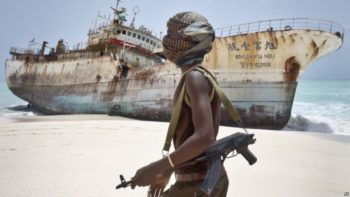
Experts have told Anadolu Agency that while recent media reports talk about a resurgence of piracy off the coast of Somalia, it had never truly disappeared.
“I would argue that piracy never went away. Despite the clear reduction, many incidents of attempted hijackings have gone unreported,” Ahmed Soliman a researcher on the Horn of Africa at the U.K.-based Chatham House tells Anadolu Agency.
He says armed security teams had deterred 11 attacks in 2016, so while the spike in incidents since March 2017 has been more widely reported, the figures dispute that piracy was ever eradicated.
Although initially, shipping companies responded swiftly to the threat of piracy by increasing security and precautionary measures, some have become complacent over time by reducing these measures, according to Soliman.
“There are also fewer naval patrols as a result of an overall reduction in piracy since 2012,” he admits.
Soliman says many of the causes of piracy remain unaddressed, namely the drought, lack of jobs for young people, ongoing illegal fishing, and availability of arms.
“This means that the chance to earn a livelihood from piracy, while dangerous, remains tempting to some,” he explains.
‘It never really went away’
There have been increased reports of hijackings of vessels by pirates since March when they first intercepted the Aris 13, a Comoros-flagged oil tanker belonging to a Greek company.
This was later followed by four hijackings, which included a Somali fishing boat, an Indian ship and a Pakistani vessel.
Experts say that although these attacks received massive news coverage, there were many other previous incidents that were not reported, thus creating a perception that piracy could have been eradicated.
Timothy Walker, a researcher on peace operations at the Institute for Security studies in Pretoria, agrees with Soliman that piracy was never stamped out in Somalia.
“Piracy isn’t back as such, because it never really went away,” Walker tells Anadolu Agency.
He says piracy has always been a risk in the East African maritime region, but its lack of international victims meant attention to the broader problem had diminished.
Walker, however, finds encouraging the reported claim that no ransom was paid for the recent release of hijacked vessels and its crewmembers.
In the past, pirates would demand millions of dollars in ransom, before releasing kidnapped crewmembers and their vessels.
According to the International Maritime Bureau, Somali pirates had launched 237 attacks off the coast of Somalia in 2011.
Illegal fishing
At the peak of piracy in 2011, Somali fishermen said they had turned to piracy after international vessels illegally fished in their waters reducing the amount of fish in the waters.
They also accused international vessels of allegedly dumping toxic wastes into their waters and destroying the Somali coastline.
A former Somali fisherman currently residing in South Africa tells Anadolu Agency that he left the business six years ago after fish stocks had been depleted by illegal foreign vessels.
“The coastline was dry at the time. I didn’t have a big boat to compete with the foreign vessels, so I decided to leave the country and seek greener pastures here,” 48-year-old Abdullah Midgan tells Anadolu Agency in Mayfair, a suburb of Johannesburg.
Most fishermen in Somalia want their government to increase measures to combat illegal fishing.
“Pirates will continue to exist if illegal fishing continues in our waters.” 34-year-old Somali fisherman Zakariya Abdi told Anadolu Agency in the capital Mogadishu.
Timothy Walker claims the threat of being a victim of piracy has driven away many illegal fishing vessels from the Horn of Africa.
“Fishing stocks were able to recover and thrive because the risk of being captured by pirates was so great,” he says.
Abdirahman Hassan, director of maritime forces for the semi-autonomous region of Puntland, in Somalia, told Anadolu Agency that at least 80 convicted pirates were currently serving sentences in different prisons in Puntland.